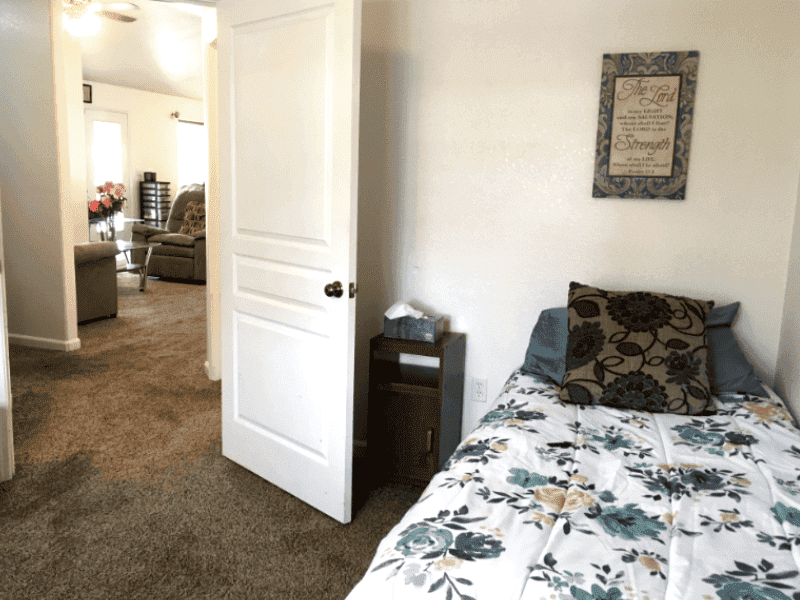
25+ Joyful Indoor Activities for Seniors That Will Transform Their Day
As seasons change in Reno and Carson City, or when mobility becomes a challenge, finding engaging indoor activities for seniors can feel like a difficult

If your elderly loved one is beginning to struggle with caring for themselves, getting them professional help, especially when you cannot provide that care, is the right thing to do.
Many senior living options that provide tailored services are available. However, if your loved one prefers to age in a more intimate family-like setting, needs help with personal care, does not require round-the-clock medical care, and would benefit from interactions with others, residential assisted living is the way to go.
Residential assisted living is a senior care service that provides a home-like environment for older adults who need help with activities of daily living (ADLs) such as bathing, grooming, eating, and transferring.
Residential assisted living homes are designed for elderly individuals who need help with day-to-day activities but do not require the level of medical care provided in a nursing home.
By providing access to essential care services and resources, these facilities ensure that residents receive the support they need in a comfortable and secure environment.

The assisted living residence can include apartments and private or shared rooms. These homes are usually former residential homes, turned into assisted living businesses.
Caregivers are available to take care of residents and keep them company.
The key feature of this senior living option is that the number of residents is small compared to traditional assisted living facilities.
Services offered by residential assisted living facilities include:

To find the best fit for your family member, you can start by conducting a thorough online search, reviewing the profiles of different providers, and checking their licensing status and compliance with government regulations.
The Department of Health or similar state agency’s website is an excellent resource to verify a provider’s license and examine their inspection and incident reports, ensuring that they meet the necessary standards for care and safety.
Residential assisted living homes, and assisted living facilities are similar in the type of service provided. Still, the key difference is in the quality of care and the overall experience of the service.
A residential assisted living home typically houses 2-10 residents per home, hence they are smaller and more intimate than a traditional assisted living community.
Caregivers are available throughout the day to assist with activities of daily living, medication monitoring, housekeeping, meal preparation, and running errands.
There is a high caregiver-to-resident ratio because of the small number of residents, and care is more personalized for each resident.
There are also opportunities for socialization and interaction. The small number allows residents to know themselves better, and form meaningful relationships with each other.
Assisted living communities are larger, and do not have the home-like feel residential assisted living communities have. Number of residents can range from 25-120. Caregiver-to-resident ratio is low because of the high number of residents, and care is not as personalized.
However, assisted living facilities because of their size may have more amenities such as fitness centers, beauty salons, and barbershops.
Additionally, assisted living care facilities may have admission requirements which may be more strict compared to residential assisted living homes.

The following are ways assisted living homes can improve the quality of life of your beloved senior.
Residential assisted living homes mimic home-like environments, which makes it easy for your loved one to adapt. The small number of residents makes it seem like one big family living under the same roof. Your loved one can feel loved and safe, and build meaningful relationships with fellow residents.
The high caregiver-to-resident ratio allows assisted living residential homes to provide care tailored to each individual. Caregivers try to understand residents like friends and design care plans that are suited to them.
Loneliness and isolation is a major concern for older adults. Residential Assisted living facilities offer a social environment where residents can interact with peers, participate in group activities, and build meaningful friendships. Social engagement is crucial for mental and emotional well-being, and these facilities often organize events and outings to keep residents active and engaged.
Good nutrition is vital for seniors’ health. Residential Assisted living homes typically provide well-balanced, nutritious meals tailored to the dietary needs of your loved one. Moreover, the communal dining experience not only ensures that your loved one is eating regular, healthy meals but also provides an opportunity for social interaction, turning meals into enjoyable social events.
Residential assisted living homes are designed with seniors’ safety and accessibility in mind. Most have features including handrails, nonslip flooring, and an emergency response system providing safety and security for your loved one.
In addition to these benefits, residential assisted living homes often have policies and plans in place to address financial assistance and long-term care planning, helping families navigate the process and apply for any available resources or programs that can help offset the cost of care.
By choosing a licensed and reputable provider, families can ensure that their loved ones are in good hands, receiving top-notch care and support that will significantly enhance their quality of life.
Amy’s Eden assisted living homes in Carson City, Reno, and the surrounding areas have been around for over a decade, providing above-industry standard care for our elderly friends as we love to call them.

Here is what sets us apart.
Regardless of your loved one’s care needs, Amy’s Eden compassionate caregivers can help them feel supported, loved, and safe.
Contact us today to learn more about our residential care home and how can help your loved one thrive in their golden years.
Get care >

As seasons change in Reno and Carson City, or when mobility becomes a challenge, finding engaging indoor activities for seniors can feel like a difficult
Family Survey Please share your honest feedback to help us improve the care and safety of your loved one.
Professional Senior In-Home Care in Carson City Keep your loved one in the comfort of their cherished home. Amy’s Eden delivers exceptional senior care services

The Best Home Care in Reno, NV The comfort of your home, the quality of Eden. We provide compassionate, professional in-home care services for seniors

Amy's Eden Senior Care © 2023